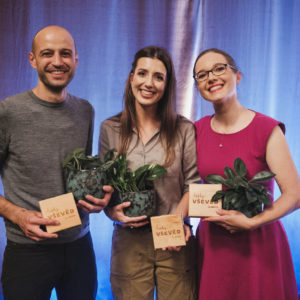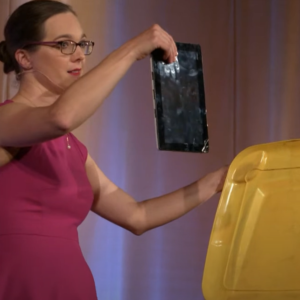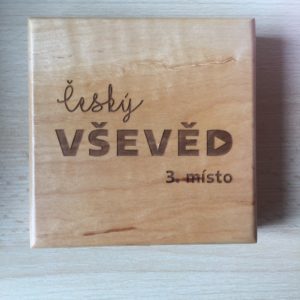Bronze Award in the Scientific Competition: Ing. Veronika Mokrejšová, Ph.D., KMP: Interview
We are happy to share that Ing. Veronika Mokrejšová, Ph.D., a member of the Department of International Business, won third place in the Czech know-it-all competition “Český vševěd všemi smysly” and became the third popularizer of science in the Czech Republic 2022. Our colleague Veronika represented not only the Department of International Business, the Faculty of International Relations, but the entire University of Economics in Prague.
The Night of Scientists takes place every year at the end of September, aimimg to introduce scientists and scientific workplaces and bring science closer to the general public. This year, its organizers came up with something new and announced a competition for the best popularizer of Czech science 2022. The finals of the Český Vševěd competition took place on Tuesday, September 13, 2022, in the Scala cinema in Brno, and Ing. Veronika Mokrejšová, Ph. D. from the Department of International Business brought Grandpa Vševeda’s golden hair from it for a beautiful third place.
Congratulations to our colleague and thank you for representing us!
Below we bring a few lines describing how the popularizer of science herself perceived the entire competition – Ing. Veronika Mokrejšová, Ph.D., hereinafter referred to as “VM”. The lines are brought by her interview with her colleague Ing. Jitka Volfová, Ph.D., hereinafter referred to as “JV”.
JV: “Veronika, why did you enter the competition in the first place?”
VM: “I just can’t pass up any opportunity I have to talk to people about food waste😊. It is a subject of my heart. So when I came across the opportunity to enter the Night of Scientists competition with the theme of All Senses, I really liked it. We can use our senses beautifully to prevent waste, so I thought to myself that I would be a good fit there thematically and that I would give it a try.”
JV: “How was the competition?”
VM: “First of all, it was necessary to shoot a popularization video on a mobile phone with a maximum length of two and a half minutes. Considering that I got to know about the competition a week before the deadline, it was quite a shock. At the time, my fellow research team members and I were finishing up our science experiment, and I wasn’t at all sure if I would make it. But thanks to the excellent service from the Department of Multimedia, we managed everything. The video is still available on YouTube and I explain the basic effects of waste, as well as the sensory test of food with a best before date, which is a simple way to save a lot of food from being thrown away. Well, in the first round it was necessary to get the most likes on Facebook, there were always three contestants competing in one week, there were 35 of us in total. My video was liked by 325 people, and thus I got to the second round, in which the expert jury selected 6 finalists of the 12 semi-finalists. When I got the email that I was to appear in the finals, I couldn’t believe my eyes.”
JV: “And the finals?”
MV: “It wasn’t that fast, we had to attend three workshops where they taught us the science slam method. Which is a stand-up comedy format in which you have to explain your scientific topic to ordinary people in 6-8 minutes. Powerpoint presentation is prohibited, on the contrary, the use of visual aids is highly encouraged. The aim of the performance was to present not only our scientific topic but also our scientific work as such and the methods we use. And people should have fun with it. The tutors were brilliant, getting the best out of us while maintaining a friendly atmosphere amongst our competitors. It wasn’t so much about who would win, but that we could pass on something to people about what we do in our research. On the final evening itself, we all presented our popularization-scientific performances, and the audience in the hall then voted for the winner.”
JV: “So what did you talk about in your performance?”
VM: “I presented the results of our research and different methods of determining the amount of wastage. And there were also the effects of waste and advice for consumers on how not to waste. Everything was supposed to be light and funny. Viewers can see how I did it in the video (1:05).”
JV: “Do you have any advice for readers on how not to waste?”
VM: “It’s always a good idea to plan your purchases and not be tempted to make excessive purchases of sale goods, which applies mainly to perishable goods. At the competition, I also promoted the introduction of the “eat-me-first” box in the refrigerator, where you put food that has been opened and that will spoil soon. The preparation of every meal should begin by looking into this box.’
JV: “So how does waste relate to our senses?”
VM: “This is the aforementioned sensory test. Foods that have a minimum shelf life date on them (and there are some that will surprise you) do not have to be thrown away after this date has passed, which unfortunately many people do automatically. They can even be sold after this date under certain conditions! We will use sight, smell, and taste (in that order) to check their safety. If anyone would like to know more, let them visit our stand at the Night of Scientists on September 30, 2022, and we will teach them with colleagues from the department in cooperation with the Food Bank.”
JV: “I will definitely come to see the scientists’ night this time! Veru, thank you for the interview and I wish you further success not only in science.”



